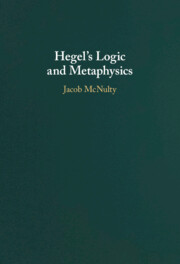Refine search
Actions for selected content:
4 results
6 - Theories and Closure
-
- Book:
- The Logic of Entailment and its History
- Published online:
- 08 February 2024
- Print publication:
- 15 February 2024, pp 119-135
-
- Chapter
- Export citation

Hegel's Logic and Metaphysics
-
- Published online:
- 26 April 2023
- Print publication:
- 26 January 2023
Chapter 8 - Logic and Attunement
- from Part III - Paradox, the Prospects for Ontology, and Beyond
-
-
- Book:
- Heidegger on Logic
- Published online:
- 15 September 2022
- Print publication:
- 22 September 2022, pp 159-181
-
- Chapter
- Export citation
8 - Emptying
-
- Book:
- Aspects of Truth
- Published online:
- 06 October 2020
- Print publication:
- 22 October 2020, pp 231-240
-
- Chapter
- Export citation
